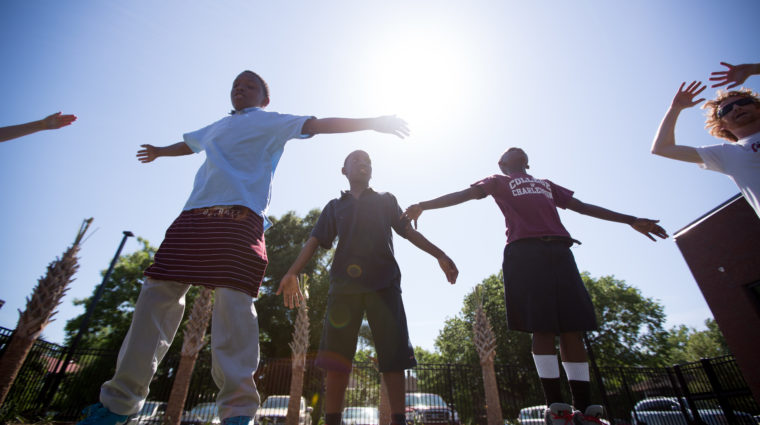Our History
A spark of inspiration, undying passion, and whole lot of hard work.
WINGS came into the picture in 1996, before many people were using—or had even heard of—the term “social emotional learning.” As we started our work, we encountered plenty of skepticism about the value of social emotional skills. A foundation once returned a proposal to us with their response written in red ink: “Who cares how children feel if they can’t read or write?!” Well, we all know kids cannot learn unless they feel supported and engaged in a safe and caring environment.
The Inspiration
In 1995, WINGS founder Ginny Deerin attended a women’s leadership conference and heard Johnetta Cole, then president of Spelman College, give a keynote address where she spoke about how girls and women often keep themselves locked up in small birdcages. Ginny recalls Dr. Cole urging the audience to envision themselves soaring beyond the cage—“the door is open, it’s up to you to fly.” During this same time, Ginny began recognizing a set of skills like empathy, individuality, and communication that could have guided her life differently if she had learned them early on. It was then that Ginny made a commitment to helping kids learn these important skills. On a yellow legal pad she scribbled a list of the vital skills, using layman’s words, and crafted a mission for what she wanted to achieve: “By the time that children are teenagers, they will know how to live joyfully, powerfully, and responsibly.” Flying home from the conference, she happened upon a copy of TIME Magazine featuring Daniel Goleman on the cover and feature story on his book, Emotional Intelligence. In that article Ginny found a list that nearly matched perfectly the one she’d sketched on the legal pad, enumerating the skills of an emotionally intelligent individual. But it was the Emily Dickinson poem “‘Hope’ is the thing with feathers” that pulled all of these moments together, inspired our name, and distilled Ginny’s vision—to help children soar with WINGS.
The Evolution
In 1996, after consulting educational experts and developing a set of preliminary learning objectives, we launched a one-week summer camp—WINGS for Girls—designed to help young girls between the ages of eight and 12 years-old develop their emotional and social intelligence, including identifying feelings, introspection, self-acceptance, handling stress and releasing tension, personal decision-making, communicating with others, and conflict resolution. Similar to WINGS today, the camp model of one counselor per each small group of girls allowed developing relationships and establishing positive bonds to take center stage. More than 100 girls from diverse backgrounds participated.
We quickly realized that one week of camp—even with intentional follow-up—wasn’t enough time for us or the girls. Not only that, young boys needed all of the lessons and connections we were instilling in WINGS girls. When summer ended we were presented with an opportunity to turn the WINGS camp model into an afterschool program at a school in Charleston, SC and WINGS Afterschool was launched!
Located in downtown Charleston, Memminger Elementary School was a neglected Title I school where 95% of students received free or reduced-price meals. What became glaringly obvious from our initial year at Memminger was the lack of opportunities available for marginalized kids: the absence of enriching after school activities, the inadequate access to support services, and the need for positive role models.
The Present
In the years since, the program has evolved and grown. We continue to develop and test strategies, hone teaching practices, and create new curriculum. What has never changed is our desire to instill important life lessons within a fresh and fun program so kids can live joyfully, powerfully, and responsibly. With an unwavering commitment to outcomes, we have been deliberate and methodical, growing slowly. Along the way, we became an AmeriCorps program, an Edna McConnell Clark Foundation grantee, the recipient of multi-year NoVo grants, a Wallace Foundation grantee, a Susan Crown Exchange grantee, and the subject of a 4-year randomized control trial conducted by the University of Virginia and funded by the U.S. Dept. of Education’s Institute of Education Sciences.
Today we help transform the lives of kids through WINGS Afterschool programs in Atlanta, Georgia and across South Carolina –and we’re spreading WINGS through a growing network of national partners and champions.
Scroll Through our Memorable Moments
Click an image to start the slideshow.
